七年级英语讲义4wps
Unit4知识点复习讲义牛津译林版英语七年级上册

七年级上册知识点复习讲义Unit 4 My day一、教学目标:过讲解,学生能够理解Unit4所出现的生词、短语和句型。
2.通过操练,学生能够巩固并掌握Unit4所出现的要点内容。
二、教学内容:七上Unit4知识点复习三、教学重难点:知识点的分析及掌握技巧四、教学程序:(一)、检查并订正上次布置的作业;(二)、解答学生在英语学习中的有关问题;(三)、教学内容:七上Unit4知识点复习与练习重点单词:1.wake2.seldom3.need4.quarter5.each6.practise7.wish8.would易考点解析:1.wake 醒来,叫醒,常和up一起构成wake sb. up结构。
在此结构当中要注意:代词作宾语时,一定要放在两个词中间。
例如:Wake me up at 1:30 p.m. 下午一点半叫醒我。
2.seldom很少,不常,是副词,反义词是often,通常置于行为动词之前,be动词,情态动词和助动词之后,是一个表示否定意义的副词。
例如:Mr Black seldom goes out. 布莱克先生很少外出。
拓展:always, usually, often, sometimes和never是英语中最常见的频度副词。
按照事情发生的频率可以表示如下:always > usually > often > sometimes > seldom > never3.need 需要。
这个词本身有两个词性:行为动词和情态动词,在实际应用当中要注意甄别词性。
具体判断方法如下:如果need后面跟的是动词原形,那此处need词性一定是情态动词,否则就是行为动词。
例如:I need look after my pet dog. 我需要照顾我的宠物狗。
(此处need为情态动词)I need to look after my pet dog. 我需要照顾我的宠物狗。
(此处need为行为动词)另外需要注意的是,情态动词只有时态的变化,变化较为单一。
外研版-七年级上册讲义-教师版-Starter4
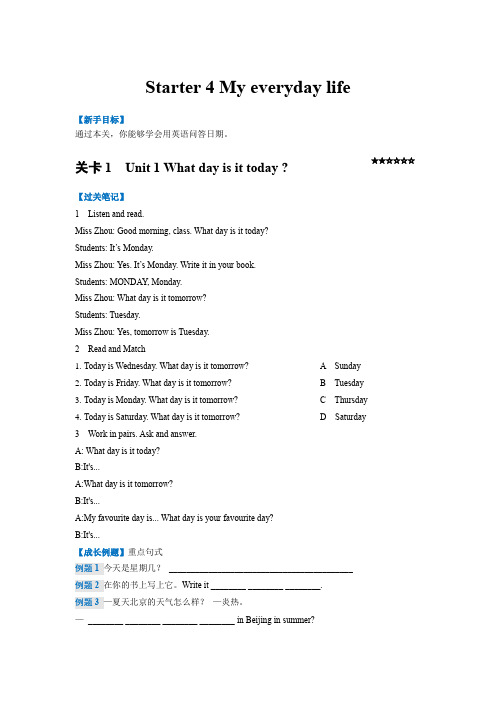
Starter 4 My everyday life【新手目标】通过本关,你能够学会用英语问答日期。
★★☆☆☆☆关卡1 Unit 1 What day is it today ?【过关笔记】1 Listen and read.Miss Zhou: Good morning, class. What day is it today?Students: It’s Monday.Miss Zhou: Yes. It’s Monday. Write it in your book.Students: MONDAY, Monday.Miss Zhou: What day is it tomorrow?Students: Tuesday.Miss Zhou: Yes, tomorrow is Tuesday.2 Read and Match1.Today is Wednesday. What day is it tomorrow? A Sunday2.Today is Friday. What day is it tomorrow? B Tuesday3.Today is Monday. What day is it tomorrow? C Thursday4.Today is Saturday. What day is it tomorrow? D Saturday3 Work in pairs. Ask and answer.A: What day is it today?B:It's...A:What day is it tomorrow?B:It's...A:My favourite day is... What day is your favourite day?B:It's...【成长例题】重点句式例题1 今天是星期几?__________________________________________例题2 在你的书上写上它。
(完整word版)人教版七年级上册英语知识点全第四单元unit4知识点.docx

教学重、难点掌握方位介的用法Unit4 重点: where 、table 、bed、 bookcase 、 sofa 、 chair 、 on、 under 、come、 desk、tidy 1、、 always...重点短:2、on the sofa在沙上on the table在桌上on your head在你的上under the chair在椅子下under the bed在床下under the table在桌下in your schoolbag在你的包里in the bookcase在柜里in your grandparents’ room在你奶奶的房里come on 快点where 引的特殊疑句,用于“某人或某物在哪里”,若be ,其构“ Where + be +主?”,be要与后面的主保持一致。
其答,用“主+be+表示地点的的介短” 避免重复,句中的主一般用代代替。
----Where is/are...?----It’ s/They’ re on /in/under...----Where is my English book?----It’ s on the desk.1)My clock is on the table?(就画部分提)________ ________ your clock?2)你的爸爸在哪?(翻下列句子)______________________________________________3、 on在⋯⋯的上面(接触)on the sofa/desk/table/bed on the tree在上(本身固有的)in在⋯⋯的里面in your schoolbag/room in the tree在上(外来的事物)under 在⋯⋯的下面(正下方)under your bed/desk若表示“某物在某地” 用“物+ be +介短” 构。
e.g. It’ s under your bed.()Theteaching building has five floors.My classroom is_______the thirdfloor.A. onB. atC. toD. on() My baseball is _______the floor, _______the table.A. on; underB. on; onC. under; underD.under; on5 、辨析 table和 desk :指“ 桌,桌”,是用餐,会或消 A table for two, please.安排两人衣着的位置。
初一第四单元讲义

初一第四单元讲义The world of numbersNumber:Everyone’s languageHow many languages do you know? Everyone knows at least① two ---his or her own language and the international language of numbers.Ancient numbers 古代数字In ancient times, people wrote numbers in many different ways② However, they nearly③ all counted in tens.ZeroThe system of number today consists of the number from 1 to 9.The India first invented④ and developed the 1 to 9 system of numbers. They then invented the zero. The invention of the zero helped people write big numbers and calculate more easily. Now use each of these ten numbers once to write the biggest number. What is it?知识解析:① at least 至少反义词 at most 至多,最多eg: The shoes are at least 100 yuan. 这双鞋至少值100元。
eg: He has at most ten books.他至多不过10本书。
② way 方式,方法,后可跟不定式或者of短语,两者含义基本相同。
eg: He is trying to find a new way of making his classes lively.eg: He is trying to find a new way to make his classes lively.③ nearly 表示“几乎”,与almost 的区别两者都含有“几乎”,“差不多”。
七年级unit1--unit4讲义
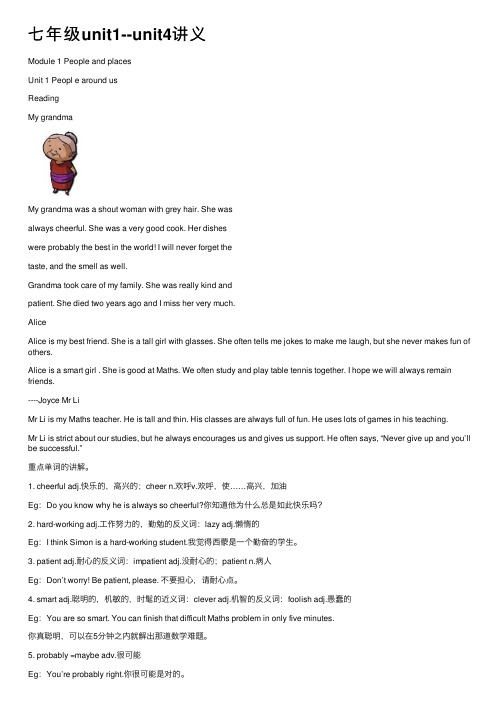
七年级unit1--unit4讲义Module 1 People and placesUnit 1 Peopl e around usReadingMy grandmaMy grandma was a shout woman with grey hair. She wasalways cheerful. She was a very good cook. Her disheswere probably the best in the world! I will never forget thetaste, and the smell as well.Grandma took care of my family. She was really kind andpatient. She died two years ago and I miss her very much.AliceAlice is my best friend. She is a tall girl with glasses. She often tells me jokes to make me laugh, but she never makes fun of others.Alice is a smart girl . She is good at Maths. We often study and play table tennis together. I hope we will always remain friends.----Joyce Mr LiMr Li is my Maths teacher. He is tall and thin. His classes are always full of fun. He uses lots of games in his teaching.Mr Li is strict about our studies, but he always encourages us and gives us support. He often says, “Never give up and you’ll be successful.”重点单词的讲解。
Unit 4(单元解读课件)七年级英语上册(人教版2024)

Period 3 语法 “Talk about
your
favourite day
and give
reasons” 谈论你最喜 欢的一天并 给出原因。
Period 4 留言板“Read two posts about school subjects in different countries and write about your favourite subjects and give reasons”
语篇
作业设计
Period 4: Level B:Refine your introduction
阅读文本 according to your teachers’ and
classmates’ advice.
Level A:Talk about your friends’
favourite subjects and explain their
语流中正确使用连读
5.就不同学科发表自己的看法,理解不同学科的价值。
分课时教学目标
分课时教学目标
语篇
作业设计
通过本节课学习,学生能够:
Period 3: Level B:Summarize what you have
1.理解并归纳连词and、but、because的表意功能和 用法。
Grammar
learned in this class ad、but、because进行表
mind map.
达,做到自然得体。 3.谈论自己喜欢的科目并解释原因。 4.调查其他成员喜欢的科目以及解释原因。
Level A:Talk about your family members’ favourite subjects and explain their reasons.
Unit4SectionA(学生版)七年级英语上册讲义(人教版)
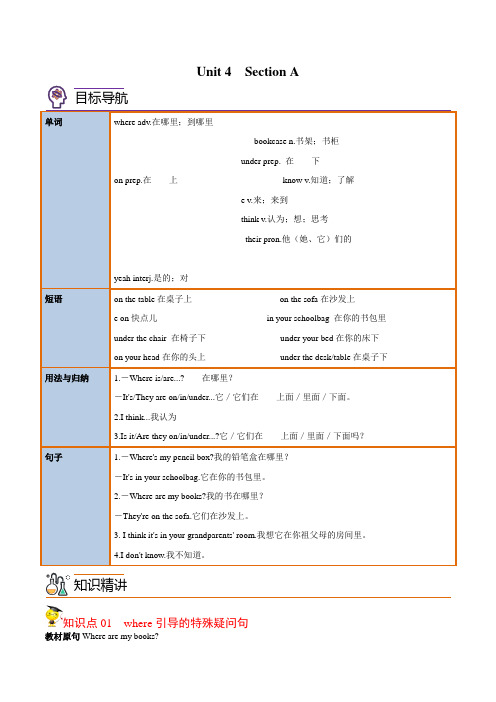
Unit 4 Section A目标导航单词where adv.在哪里;到哪里bookcase n.书架;书柜under prep. 在······下on prep.在······上know v.知道;了解e v.来;来到think v.认为;想;思考their pron.他(她、它)们的yeah interj.是的;对短语on the table在桌子上on the sofa在沙发上e on快点儿in your schoolbag 在你的书包里under the chair 在椅子下under your bed在你的床下on your head在你的头上under the desk/table在桌子下用法与归纳 1.-Where is/are...?······在哪里?-It's/They are on/in/under...它/它们在······上面/里面/下面。
2.I think...我认为······3.Is it/Are they on/in/under...?它/它们在······上面/里面/下面吗?句子 1.-Where's my pencil box?我的铅笔盒在哪里?-It's in your schoolbag.它在你的书包里。
2.-Where are my books?我的书在哪里?-They're on the sofa.它们在沙发上。
3. I think it's in your grandparents' room.我想它在你祖父母的房间里。
七年级英语第四单元课件资料

课文解析
背景介绍
词汇解释
介绍文章的主题和背景,激发学生对文章的 兴趣和好奇心。
列出文章中的生词和短语,解释其含义和用 法,帮助学生扫清阅读障碍。
句子分析
段落解读
选取文章中的典型句子进行分析,帮助学生 理解文章的语言结构和表达方式。
对每个段落进行解读,概括段落的中心意思 和逻辑关系,帮助学生把握文章的整体结构 。
案例二
一位中国商人前往美国参加商务会议时因为文化差异导致的不适和困难。
分析
通过以上案例可以看出,跨文化交际中需要尊重和理解对方的文化,采取适当的交际方式和沟通技巧,以实现有效的沟通 和合作。同时,也需要提高自身的跨文化意识和能力,以更好地适应全球化时代的挑战。
07
课堂活动设计
小组讨论和辩论
总结词
主要语法结构
掌握一般现在时的基本结构和用法。 掌握名词的复数形式和变化规则。
掌握动词的一般现在时形式和变化规则。 掌握代词的基本形式和用法。
句型和例句
1
掌握10个基本句型,包括主语+谓语、主语+谓 语+宾语等。
2
掌握句型的变化规则,如疑问句、否定句等。
3
掌握句子的基本结构,如简单句、并列句等。
03
目标和要求
目标
学生能够熟练掌握日常交流用语,进行简单的英语对话。
要求
学生需要掌握本单元所涉及的单词、语法和句型,能够进行简单的英语对话和自 我介绍。
教学重点和难点
教学重点
日常交流用语和句型的学习和应用。
教学难点
正确使用英语进行对话和表达,了解英语国家文化差异。
02
词汇和语法
重点词汇
掌握30个生词,包括拼写和词义。 掌握10个短语,包括搭配和用法。
七年级英语第四单元课件资料

七年级英语第四单元课件资料xx年xx月xx日•单元整体介绍•听力与阅读•语法与语言点目录•写作与表达•文化与交际•教学资源推荐01单元整体介绍这个单元主要围绕“购物”这个主题展开,内容涉及购物的方式、地点、以及购物的体验等。
主题《Unit 4 Shopping》这个单元共包括三个部分,分别是“Section A”,“Section B”和“Self Check”。
内容单元主题与内容1单元教学目标23要求学生能够掌握并运用本单元所学的词汇和短语,理解并掌握如何表达购物的方式、地点等。
知识目标要求学生能够运用本单元所学的语言知识进行购物对话,并能够简单地写出购物计划。
能力目标通过本单元的学习,帮助学生提高他们的口语能力,增强他们在实际生活中运用英语的能力。
情感目标教学重点使学生掌握本单元的重点词汇和短语,并能够熟练地进行购物对话。
教学难点使学生能够运用本单元所学的知识,简单地写出购物计划,并能够在特定的情境中进行购物。
教学重难点02听力与阅读根据题目和选项预测可能会听到的内容,有目的地听。
预判信息在听力过程中注意听清关键信息,如时间、地点、人物等。
抓住关键信息用简单的符号或缩写记录关键信息,提高记忆效率。
速记要点快速浏览全文,掌握文章大意和结构,寻找特定信息。
快速阅读仔细阅读文章,分析句子结构和重点词汇,理解文章细节。
细读理解根据文章内容进行推理判断,理解作者意图和观点。
推理判断阅读难点生词较多,部分句子结构复杂,需要学生结合上下文理解。
课本阅读材料特点本单元的阅读材料以记叙文为主,内容贴近学生生活,语言生动活泼。
阅读重点掌握阅读技巧,理解文章大意和重点细节,提高阅读速度和准确性。
课本阅读材料分析03语法与语言点总结词七年级英语第四单元的重点语法包括现在进行时态、一般现在时态、there be句型以及人称代词和物主代词的用法。
详细描述现在进行时态表示正在进行的动作或状态,常与always、sometimes等时间副词连用;一般现在时态表示经常性、习惯性的动作或状态,主语为第三人称单数时,谓语动词要用单数形式;there be句型用来表示存在关系,可以表示人或事物;人称代词和物主代词是用来代替名词或形容词的,人称代词分为第一人称、第二人称和第三人称,物主代词分为形容词性物主代词和名词性物主代词。
Module4Unit3七年级讲义(学生版)
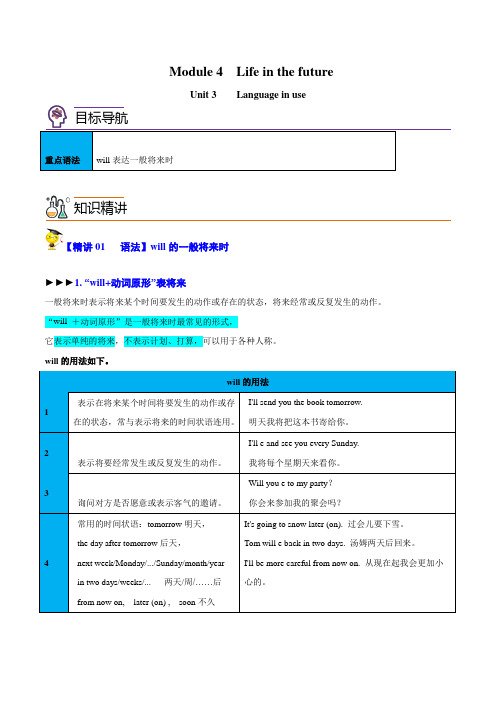
Module 4 Life in the futureUnit 3 Language in use重点语法will表达一般将来时【精讲01 语法】will的一般将来时►►►1.“will+动词原形”表将来一般将来时表示将来某个时间要发生的动作或存在的状态,将来经常或反复发生的动作。
“will +动词原形”是一般将来时最常见的形式,它表示单纯的将来,不表示计划、打算,可以用于各种人称。
will的用法如下。
will的用法1表示在将来某个时间将要发生的动作或存在的状态,常与表示将来的时间状语连用。
I'll send you the book tomorrow. 明天我将把这本书寄给你。
2表示将要经常发生或反复发生的动作。
I'll e and see you every Sunday. 我将每个星期天来看你。
3询问对方是否愿意或表示客气的邀请。
Will you e to my party?你会来参加我的聚会吗?4常用的时间状语:tomorrow明天,the day after tomorrow后天,next week/Monday/.../Sunday/month/yearin two days/weeks/... 两天/周/……后from now on, later (on) , soon不久It's going to snow later (on). 过会儿要下雪。
Tom will e back in two days. 汤姆两天后回来。
I'll be more careful from now on. 从现在起我会更加小心的。
知识精讲目标导航【典例】Jim and Jack ________ to Los Angeles in two days.A.will go B.goesC.go D.is going【口诀】will用法口诀:►►►2. will的句式结构【典例】_____ you stay for dinner? Sorry,I must go. My sister is ing to see me. A.Must B.Shall C.Need D.Will【拓展】be going to和will辨析今晚他打算写一封信。
Unit4SectionA(教师版)七年级英语下册讲义(人教版)
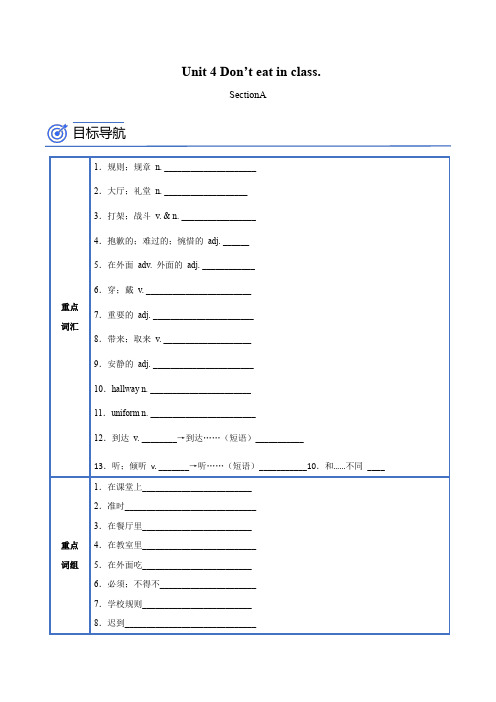
Unit 4 Don’t eat in class.SectionA重点词汇1.规则;规章n. _____________________2.大厅;礼堂n. ___________________3.打架;战斗v. & n. _________________4.抱歉的;难过的;惋惜的adj. ______5.在外面adv. 外面的adj. ____________6.穿;戴v. ________________________7.重要的adj. _______________________8.带来;取来v. ____________________9.安静的adj. _______________________10.hallway n. _______________________11.uniform n. ________________________12.到达v. ________→到达……(短语)___________13.听;倾听v. _______→听……(短语)___________10.和……不同____重点词组1.在课堂上_________________________ 2.准时______________________________ 3.在餐厅里_________________________ 4.在教室里__________________________ 5.在外面吃_________________________ 6.必须;不得不______________________ 7.学校规则_________________________ 8.迟到______________________________目标导航【答案】重点词汇:1.rule2.hall3.fight4.sorry5.outside6.wear7.important8.bring9.quiet10.走廊;过道11.校服;制服12.arrive arrive in/at…13.listen listen to…重点词组:1.in class2.(be) on time 3.in the dining hall4.in the classroom5.eat outside6.have to7.school rules8.arrive late9.in the hallways10.wear a hat11.wear the school uniform12.bring…to…‘’1.Don’t arrive late for class。
牛津译林版七年级英语下册Unit4基础版讲义

江苏译林七年级下册Unit4 Finding your way一、教学目标1.巩固本单元新单词2.掌握本单元的重难点句型并熟练运用二、课堂引入I.课前小测1.There is always too much _________(来往车辆)in rush hours.2.Look at the __________ (指示牌) over there. It says “No smoking!”3.You need to use your knowledge to open the ________ (宝藏)box.4.Every time I walk _________ (经过)the shop, I will stop to buy some chocolate.5.The birds make beautiful ________ (声音)when they sing.6.Do they eat ________(充足)of vegetables and fresh fruit?7.Go along the ________ (小路) near the river, and then you can see the bridge.8.Don’t just keep your brother ________(跟随)you. You should teach him how to make it himself.9.Children must learn how to keep their lives from ________(危险).10.Sandy, ________(记住)to bring your homework to me.11.When the little boy saw the dog playing wonderful tricks, he began to ________ (大笑). 12.Before you ________(穿过)the street, you must look carefully first.13.Don’t keep the little bird in the ________(笼子).14.A ________ (桥) flies across the river from the south to the north.15.I will wait for you at the ________ (出口) to the cinema after the film is over.II.重难点词汇讲解Wele to the unit1.Follow me, Eddie.(对标课本P42 )follow vt.跟随;沿着﹔遵循follow sb.跟随某人﹔仿效某人e.g.Follow the road and then turn left.Please follow the rules.following adj.接下来的e.g.Read the following passages.【例题讲解】1.(2122七年级下·江苏苏州·期中)—Excuse me, can you tell me the way to Sunshine Park?—Just me. I am going there, too.2.Are you sure, Hobo?(对标课本P42)be sure确信,有把握(1) be sure to do sth.表示说话人推测“一定,必然会”。
unit4讲义英语七年级上册

2. ________ n. 杯子 4. ________ v. aux. 将;愿意(用以提出建议或邀请) 6. ________ n. 色拉(凉拌生菜) 8. cereal n. ________ 10. ________ n. 饼干 112. ________ n. 巧克力 14. ________ pron. 一切事物 16. ________ n. 葡萄
9. 你有了你清单上的所有东西。 You have ________ on your list.
10. 我可以把它写下来。 I can ________ ________ ________.
11. 做得好,妈妈。 ________ ________,Mum.
1. 李明带着杰克去早市。 Li Ming ________ Jack ________ the morning market.
精讲讲义
课程性质:正式课 学生姓名:
授课内容 授课日期及时段
年 级: 初一 辅导科目:英 语
课 时 数: 2 学科教师:
Unit 4
2021 年 11 月日 教学内容
一、 核心单词
1. ________ n. 糖 3. ________ n. 餐馆 5. ________ num. 十五 7. ________ adj. 美味的,可口的 9. ________ n. 肉 11. ________ adj. 满的,充足的 13. ________ n. 工作 15. ________ n. 梨 17. ________ n. 西瓜 19. ________ n. 市场 21. ________ n. 牛肉 23. ________ n. 菜单 25. ________ num. 十四 27. ________ n. 问题;难题 29. ________ n. 饺子(常用复数形式) 31. ________ num. 二十 33. ________ n. 冰箱 35. ________ n. 三明治 37. ________ adv. 离开(某处);在(某距离)处
- 1、下载文档前请自行甄别文档内容的完整性,平台不提供额外的编辑、内容补充、找答案等附加服务。
- 2、"仅部分预览"的文档,不可在线预览部分如存在完整性等问题,可反馈申请退款(可完整预览的文档不适用该条件!)。
- 3、如文档侵犯您的权益,请联系客服反馈,我们会尽快为您处理(人工客服工作时间:9:00-18:30)。
七年级英语讲义4【重点词组】1.Thanks=thank you谢谢2. these are这些是3.those are那些是4.in the picture在图中5.talk about谈论关于6.family photo家庭照片7.have a good day过得愉快8.family tree家谱9.draw a picture画画10.a photo of my family的一张家庭照片11.in the first photo在第一张照片里12.in the next picture在下一张照片里13.the name of my dog我的狗的名字【重点句型、交际用语】1.向别人介绍某人的日常用语This is my sister Kate.这是我的妹妹凯特。
That is my grandfather.那是我的爷爷。
These’re my brothers.这些是我的兄弟。
Those’re my parents.那些是我的父母。
2.介绍家庭照片的交际用语Here are two nice photos of my family.这是我的两张漂亮的家庭照片。
Here is a photo of my family.这是我家的全家福照片。
3.询问某人的交际用语Who’s she?她是谁?Is he your father?他是你的父亲吗?No, he isn’t. He is my uncle.不,他不是。
他是我的叔叔。
Are those our parents?那是你的父母吗?Yes, they are.是的,他们是。
【重点语法】一、指示代词(一)定义:表示“这个,那个,这些,那些”等明确指示人或事物的代词,称为指示代词。
指示代词用法例句this(these)用于指时间、空间较近的事物This is my pencil.这是我的铅笔。
These are his brothers.that(those)用于指时间、空间较远的食物That is his book.那是他的书。
Are those your parents?那些是你的父母吗?(二)回答指示代词应注意以下几点1.在回答主语是this或that的一般疑问句或特殊疑问句时,通常用it来代替句中的this或that,以避免重复。
如:what’s this?—It’s an egg.这是什么?它是一个鸡蛋。
2.在回答these或those的一般疑问句或特殊疑问句时,通常用they来代替句中的these或those,以避免重复。
如:Are those apple trees? No, they aren’t.那些是苹果树吗?不,它们不是。
二、名词复数在英语中,名词分为可数名词和不可数名词两大类。
可数名词有单数和复数两种形式。
不可数名词没有复数形式,可数名词变复数形式的规则如下:(一)规则变化词形特点构成方法读音例词大多数名词在词尾加s清辅音后读/s/,在浊辅音后和元音后读/z/ cat—cats bag—bagsbee—bees以s,x,sh,ch等结尾的名词在词尾加es读/iz/ box—boxes watch—watches以“辅音字母+y”结尾的名词把y变i,再加es读/z/ family—families baby—babies第1页共4页以o结尾的名词直接加s或es读/z/ tomato—tomatoesphoto—photos以ce,se,ze,ge等结尾的名词直接加s读/iz/ orange—oranges picture—pictures以f或fe结尾的名词将f或fe变v加es读/vz/ wife—wives leaf—leaves(二)不规则变化构成方法例词改变元音字母man-menfoot-feetwoman-womentooth-teeth词尾加en或ren child-children单复数同形Deer(鹿)sheep(羊)Chinese(中国人)Japanese(日本人)(三)复合名词变复数构成方法例词一般的复合名词,只把中心词变为复数(中心词一般是第二个名词)apple tree- apple treespencil box--pencil boxes由man和woman构成的复合名词,二者均变为复数man doctor- men doctorswoman teacher- women teachers三、单数句变复数句的规则把一个单数句变为复数句,要遵循下列规则:一变,一删,六不变。
一变:将单数句中的指示代词、人称代词、物主代词、名词以及系动词变为相应的复数形式。
this-thesethat-thosehe/she/it-theyI-wemy-ourhis/her/its-their一删:将单数句中的不定冠词a/an删去。
六不变:保留句中的形容词、定冠词the、副词、疑问词、介词短语和叹词等。
I am a student.—We are students.This is a nice key.—These are nice keysWhat’s that?—What are those?.【基础练习】一.根据汉语写单词。
姐;妹__________妈妈;母亲__________爸爸;父亲__________父亲或母亲__________兄;弟__________祖母;外祖母_________祖父;外祖父__________祖父(母);外祖父(母)__________家;家庭_________那些__________谁;什么人_______这些__________他(她、它)们_______嗯;好吧_________经受;经历_________一天;一日;白天_________过得愉快____________儿子__________堂(表)兄弟;堂(表)姐妹__________妈妈_________姨母;姑母;伯母;婶母;舅母__________爸爸________女儿__________舅父;叔父;伯父__________这就是;在这里__________照片___________属于(某人或某物)___________下一个(的);接下来(的)_________照片,图画________女孩_________狗_________二.用指示代词this, that,these或those的适当形式填空。
1.What’s ________ over there(在那边)?—It’s a bus.2.Are ______ your books?—Yes, they are.3.Are______ your pencils?—No, my pencils are here.4.Hello. _______ is Jane. Is ______peter?三.用所给词的适当形式填空。
1. My aunt has three_________(brother).2. Here are some_______(photo).3. There are two_______(boy) in the picture.第2页共4页4. Isthat his_______(orange)?5. I have four_________(dictionary).四.句型转换1. It’s his family photo.(改为复数句)_____ ______ his family_______.2. Are those jackets? (改为单数句)_______ that______ _______?3. They are girls.(改为单数形式)_____ ______ _______ _______.4. This is my father. This is my mother. (合并为一句,句意不变)_____ are my ______.5. That is her sister.(改为复数句)_____ ______ her_____.【能力提高练习】一.词形转换1.sister(对应词)______2.mother(对应词)______3.these(对应词)_______4.father and mother(合并为一词)_____5.grandpa(同义词)_______6. he(物主代词)_______7.her(主格)_______8. don’t(完全形式)_______9. are not(缩写)______10. this(反义词)_______11.this(复数)_______12. that(复数)_______13.parent(复数)_______14. photo(复数)_______二.单项填空()1. Tom! _____ my parents.A. This isB. That isC. It isD. These are()2. ____is Alice?—She is my cousin.A. WhoB. WhatC.what color()3. Are those your brothers?—________A. Yes , those areB. No, those aren’tC. No, these aren’tD.Yes, they are()4. Is that your friend?—_____A. Yes, it’sB. Yes, it isn’tC. Yes, it isD. Yes, he is()5. He plays basketball______.A. niceB. fineC. goodD.well()6. My parent______at home.A. amB.isC.areD.be()7. They _______good friends.A.areB.isC.amD.be()8. Boys and girls, today is Sunday(星期天). Have a good time.—________A. Thank you! You, too.B. We won’t be happy.C. YesD. No, you don’t say it.()9. Look! This is a______ of my friend. She used to(过去常常)have short hair(短发).A.photoC.setD.aunt()10. _______your books.A. Here areB. Here isC. Are hereD. Is here三.按要求进行句型转换(10分)1. This is my friend.(变为复数句)________________________第3页共4页2. Is that your baseball?(变为复数句)________________________3. These computers are new.(变为单数句)________________________4. Are those dictionaries here?(变为单数句)_______________________5. It‘s my backpack.(变为复数句)________________________6. These are his grandparents.(变为一般疑问句)________________________7. Those are photos.(就画线部分提问)________________________8. Are these school things?(作否定回答)________________________9. The woman teacher is at school.(变为复数句)________________________10. This is a girl student.(变为复数句)________________________四.连词成句,请注意标点符号。
